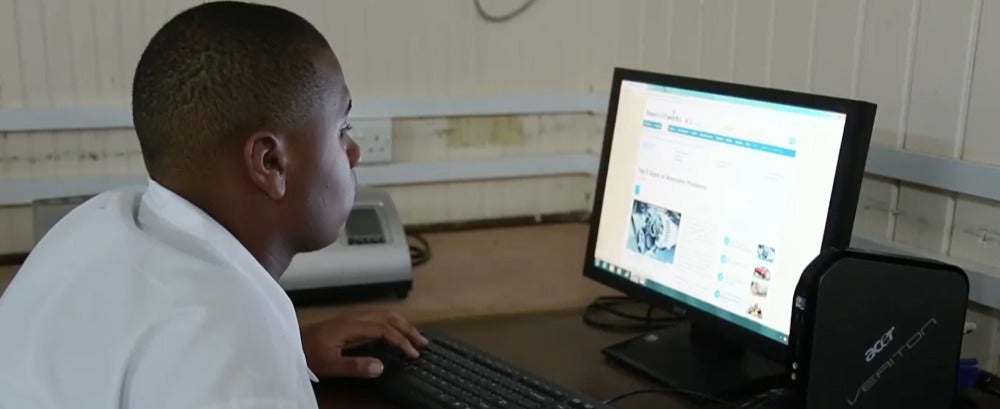 Caribbean student in a virtual class
Caribbean student in a virtual class
Winston Edwards sighs with frustration as the Internet disconnects for the fourth time of the day. As if it was not enough having to study with his siblings running around, making it difficult to concentrate, he now must redo the assignment yet again.
Before the pandemic, Winston was one of many young men earning a living as a waiter in a prominent tourist hotel in the Eastern Caribbean. With the economic deceleration and worldwide travel restrictions, Winston, like many others, lost his job. Losing his income hit his family hard, and the pandemic also made his dream of becoming a chef harder to achieve.
With the downturn in the hospitality sector and the challenges in obtaining his culinary certificate, Winston is at risk of dropping out of his program and becoming long-term unemployed. Joblessness would cause serious harm to Winston’s own human capital and skills, with possible long-lasting implications for him and his family.

Priority number 1: Education
On March 16, 2021, a group of representative heads and deans of Eastern Caribbean States (ECS) national colleges met virtually to discuss the challenges facing the education sector in the region due to the COVID-19 pandemic. The aim of the meeting was to identify priorities to include in a potential response to support technical education systems in the region. The Organization of the Eastern Caribbean States (OECS) Commission hosted this meeting in collaboration with the World Bank.
To better understand the emerging situation, the World Bank, in collaboration with the OECS Commission, deployed a regional survey targeting heads and deans of ECS national colleges. The survey compiled responses from seven post-secondary institutions and the objective was to identify the main challenges they are facing amid the pandemic and priority areas to develop a regional response
Survey results revealed that, while national colleges are currently open, the pandemic has forced them to shift to virtual instruction models and the transition has not been easy. For instance, a total of three colleges reported having cancelled or postponed practical training, including internships, dual programs, and the use of school laboratories and workshops. Further, the survey indicated that more than 25% of all students do not have adequate connectivity. Despite ongoing efforts to provide virtual education, many students cannot access it.
The survey also highlighted that online learning cannot offer students the hands-on pedagogical experiences necessary to develop practical skills. According to most of the respondents, the main barriers to providing adequate digital learning opportunities are limited financial and human resources, as well as suitable infrastructure.
The impact of the pandemic on students
The leaders of the national colleges expected that COVID-19 would have detrimental impacts on the student population. For instance, one-third of all survey respondents indicated that new students entering the system will be less academically prepared. Moreover, about half of all survey respondents believe that student dropouts are rising and that new students will be negatively affected by mental health problems due to the pandemic.
The participants in the national colleges’ meeting agreed that the pandemic had posed new challenges that national colleges are not ready to address appropriately. They stressed that it has become imperative for them to work together as a network to face emerging challenges. A key take-away from the discussions was the need to operate more collaboratively than in silos. Working across ECS colleges could help design and implement more efficient joint solutions, such as shared digital content platforms, improving student services, and fostering teacher professional development.
Most survey respondents considered that promoting collaboration across national ECS colleges is a priority. Nonetheless, all respondents indicated that their current level of collaboration is low due to a lack of a clear framework and financial resources.
Survey results also showed strong concerns regarding the inadequacy of financial and human resources available for the provision of student services. These include remediation, counseling, and employment support. They also indicated that national colleges lack information systems capable of assessing the needs of employers, identifying students at risk, and tracing student employment to work transition.
Priorities moving forward
Following on the national colleges' priorities in the survey and the meeting, several possible responses to the current challenges that technical education is facing in the region emerged. Some key priorities moving forward are:
- Utilize EdTech and digital solutions to improve academic offerings. Colleges need to make use of virtual platforms that provide up-to-date and relevant courses for the needs of the rapidly changing labor market . Developing Virtual Laboratories and platforms designed to build students' soft skills will facilitate the transition between technical education and employment. Online platforms can also be considered to provide students with opportunities to access adaptive computer-assisted remediation programs (ACARPs) in areas such as mathematics.
- Improve student services. The technical colleges agreed that to cope with the effects of the pandemic, student services for support and remediation, counseling, and career services would need to be developed and strengthened. Clubs and associations will also be pivotal to developing students' socio-emotional skills.
- Build regional networks. Training institutions in the ECS will need to design clear frameworks and financing mechanisms for inter-institutional cooperation. Possible areas of collaboration include credit transfers, collaborative one-stop-shop digital content platforms, teacher exchanges, and joint research programs.
- Develop results-based information systems. Leaders of ECS national colleges highlighted a lack of information systems that provide critical information for enhancing their program’s quality and relevance. Results-based information systems could fill this gap. These include developing student assessments that look at cognitive, technical, and socio-emotional skills and introducing teacher assessments of vocational, pedagogical, and digital skills, including the generation of instruments for class observations. Early warning systems can also contribute to identifying concerns in the quality and relevance of the program offerings. Tracer studies, skills surveys, and blockchain credentialing systems could be adopted to boost the relevance of technical education for the labor market.
- Ensuring adequate investments in the sector. The Organization of Eastern Caribbean States Task Force on Higher Education and the World Bank will explore the possibility of systematically supporting regional skills and post-secondary education. A concrete first action would be developing a community of practitioners to assess common ways to build shared digital content, such as online virtual laboratories, that could serve all national colleges. This initiative will be supported and financed by the Korea World Bank Partnership Facility (KWPF).
It will be of critical importance to take concrete actions to ensure individuals like Winston receive adequate support during this challenging time.





Join the Conversation